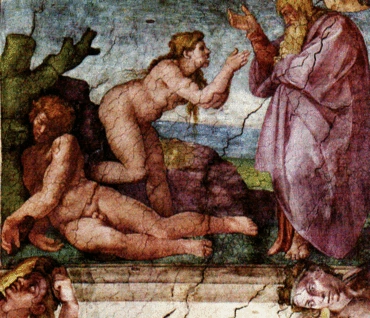22
യഹോവയായ ദൈവം മനുഷ്യനില്നിന്നു എടുത്ത വാരിയെല്ലിനെ ഒരു സ്ത്രീയാക്കി, അവളെ മനുഷ്യന്റെ അടുക്കല് കൊണ്ടുവന്നു.
22
യഹോവയായ ദൈവം മനുഷ്യനില്നിന്നു എടുത്ത വാരിയെല്ലിനെ ഒരു സ്ത്രീയാക്കി, അവളെ മനുഷ്യന്റെ അടുക്കല് കൊണ്ടുവന്നു.
Ni Brian David

The Lord is life itself. We are recipients of life. We give life unique forms because of our unique shapes as receptacles, and through free will we can choose how fully we will receive life. But we don't have life of our own. It follows from this that the more we turn toward the Lord and receive life, the more alive we will be; and the more we turn away the more dead we will be. It also follows that believing life is our own – with all the loves, the thoughts and the power that entails – is actually the antithesis of life.
This is the state of those in the deepest hells, who reject everything of the Lord, even His existence, and claim all life as their own. They are, in fact, only alive because the Lord forces life on them in the amount necessary to sustain existence.
This is, in a sense, what is represented by the rib – which is human, and is alive, but only in the most limited way. When the people of the Most Ancient Church (Adam) wanted to lead themselves and sense life as their own, the Lord had to use that most dead aspect of them to grant their wish. He had to use that bone, which represents our most hellish potential, what we would be if we were to reject the Lord completely.
But then the Lord did something miraculous. He turned that bone into living flesh, into a new person: the woman Eve. This represents that the Lord built that most dead, most hellish aspect of us up into something which felt life as its own, but could acknowledge that life actually came from the Lord, and could thus again be a recipient of life. It wasn't quite as pure as before; people could no longer commune directly with the Lord. But they had what they wanted instead: a sense of self.
The Writings call this – both the rib and the woman – by the Latin word proprium, essentially meaning "as of self." The rib represents the proprium on its own, which is hellish. The woman represents the proprium given life by the Lord.
(Mga Sanggunian: Arcana Coelestia 151, 152, 153, 154, 155)
9656. 'And they shall be paired from below, and at the same time paired up to its head' means a joining together from without and from within. This is clear from the meaning of 'being paired' as being made to act jointly; from the meaning of 'from below' as from without, since the Word portrays what exists outwardly as that which is below, and what exists inwardly as that which is above, 3084, 4599, 5146, 8325 (so that things deep down are more outward and those high up more inward, 2148, 4210, 4599); and from the meaning of 'the head', in the expression 'from below up to the head', as from within. The reason why 'the head' has this meaning is that the head is above the body, and by things above are meant those that are inward, as has just been stated; and in addition to this a person's inward powers are located in the head, for in it reside the beginnings of the senses and motions, and the beginnings are inmost because they are the source from which everything else flows. These beginnings are like wellsprings from which streams of water flow.
[2] This also goes to explain why inward things are portrayed in the Word as 'the head', as in Isaiah,
Jehovah will cut off from Israel head and tail, the branch and the bulrush in one day. Isaiah 9:14.
In the same prophet,
There will not be for Egypt [any] work which the head and tail, branch and bulrush will do. Isaiah 19:15.
This refers to the Church, the inward things of which are 'the head' and the outward ones 'the tail'.
[3] In the same prophet,
On all heads there is baldness; every beard is shaved off. Isaiah 15:2.
'Baldness on heads' stands for the absence of good and truth in inward things, 'beard shaved off' for the absence of good and truth in outward things. In Jeremiah,
You will be put to shame by Egypt, as you were put to shame by Asshur, and your hands will be on your head. For Jehovah has loathed your defences. Jeremiah 2:36-37.
This describes shame on account of the loss of the Church's forms of good and its truths, brought about by factual knowledge and by reasonings based on it, 'Egypt' being factual knowledge and 'Asshur' reasoning based on it. 'Hands on head' stands for covering over inward things owing to shame. Something similar occurs elsewhere in the same prophet,
They were put to shame and subjected to ignominy, and they covered their heads. Jeremiah 14:3-4; 2 Samuel 13:19.